Module 10 On the radio Unit 3 Revision 课件(共22张ppt) 外研版八年级下册
文档属性
| 名称 | Module 10 On the radio Unit 3 Revision 课件(共22张ppt) 外研版八年级下册 |  | |
| 格式 | pptx | ||
| 文件大小 | 4.5MB | ||
| 资源类型 | 教案 | ||
| 版本资源 | 外研版 | ||
| 科目 | 英语 | ||
| 更新时间 | 2024-11-23 17:53:33 | ||
图片预览

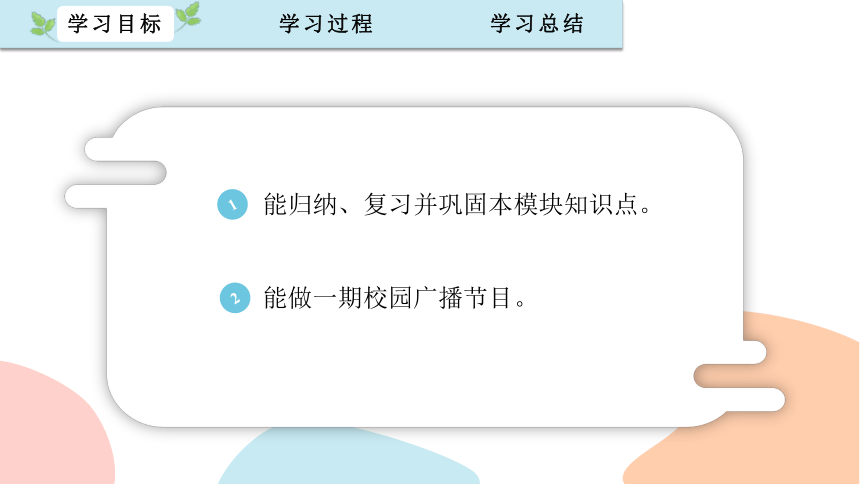
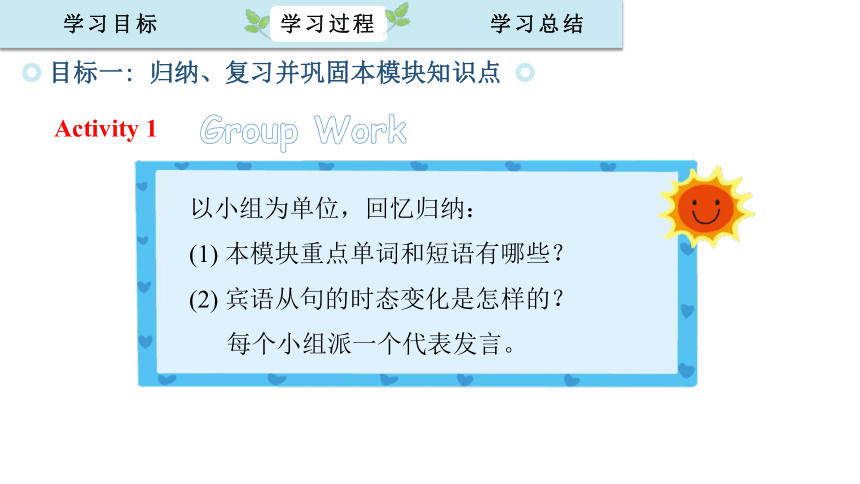
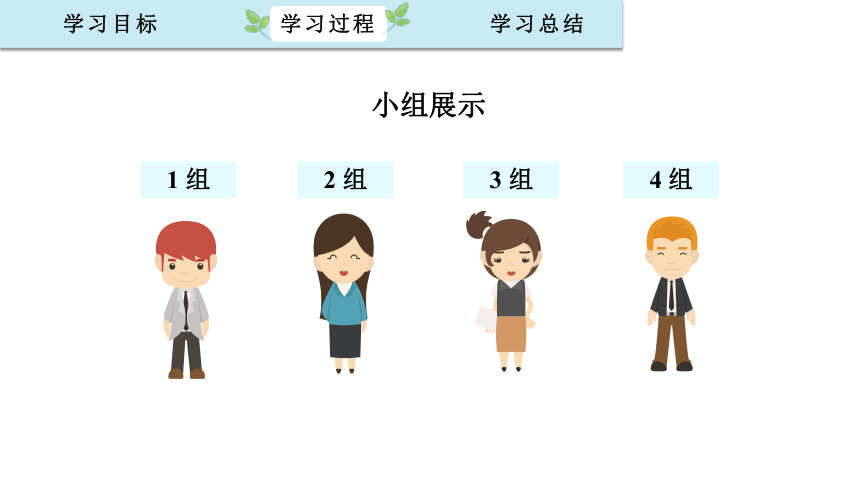
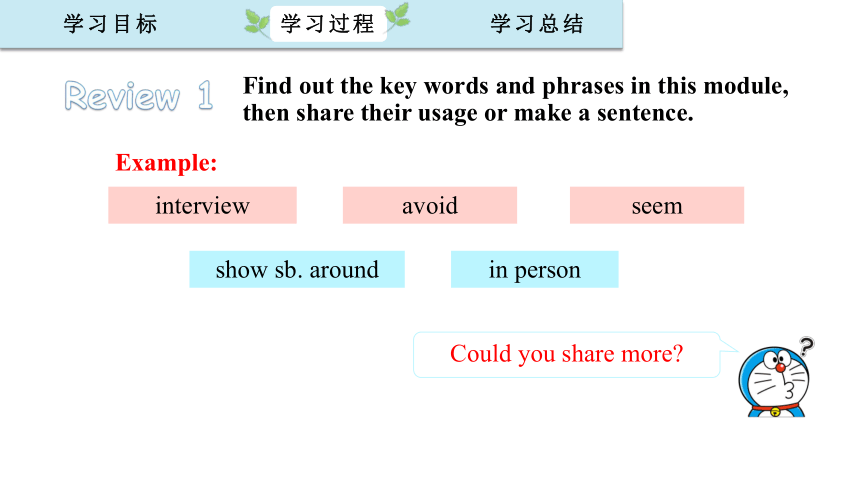
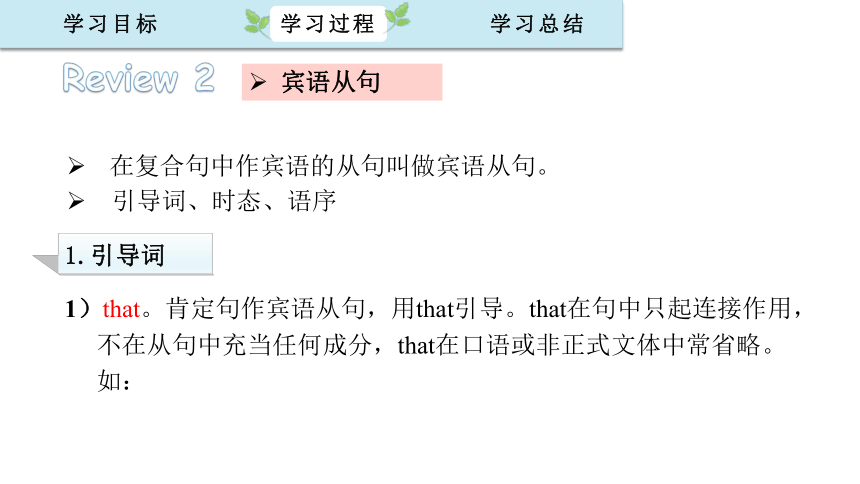
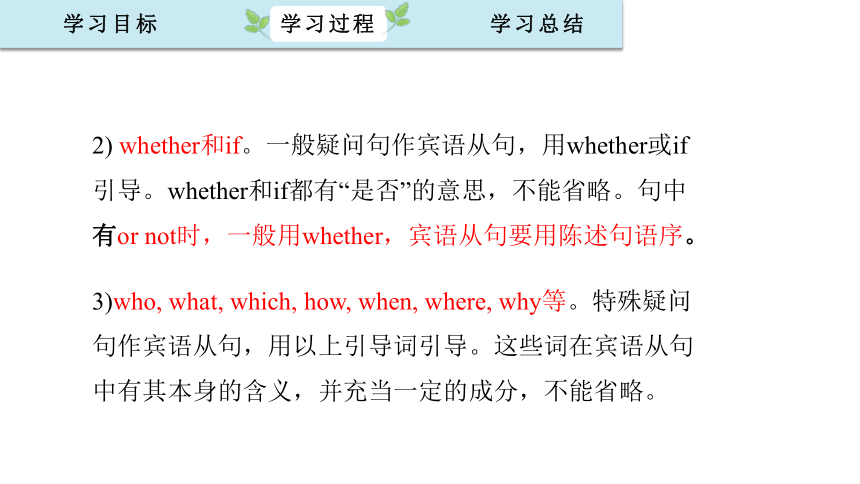

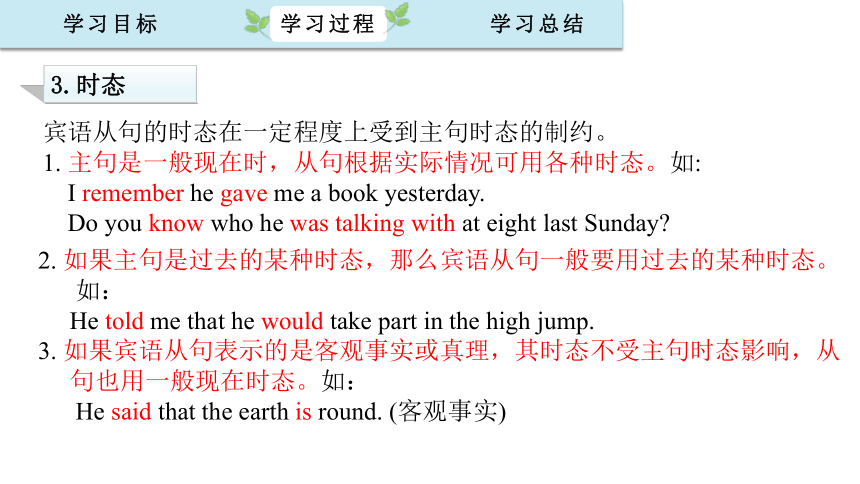
文档简介
(共22张PPT)
Module 10 Unit 3
Language in use
Revision
1
2
能做一期校园广播节目。
能归纳、复习并巩固本模块知识点。
目标一: 归纳、复习并巩固本模块知识点
Activity 1
Group Work
以小组为单位,回忆归纳:
(1) 本模块重点单词和短语有哪些?
(2) 宾语从句的时态变化是怎样的?
每个小组派一个代表发言。
1 组
2 组
3 组
4 组
小组展示
Find out the key words and phrases in this module, then share their usage or make a sentence.
Review 1
interview
show sb. around
seem
in person
avoid
Example:
Could you share more
Review 2
宾语从句
在复合句中作宾语的从句叫做宾语从句。
引导词、时态、语序
1)that。肯定句作宾语从句,用that引导。that在句中只起连接作用,不在从句中充当任何成分,that在口语或非正式文体中常省略。如:
1.引导词
2) whether和if。一般疑问句作宾语从句,用whether或if引导。whether和if都有“是否”的意思,不能省略。句中有or not时,一般用whether,宾语从句要用陈述句语序。
3)who, what, which, how, when, where, why等。特殊疑问句作宾语从句,用以上引导词引导。这些词在宾语从句中有其本身的含义,并充当一定的成分,不能省略。
2.语序
无论主句是什么语序,在宾语从句中,除了引导词放在从句的句首外,其余部分要用陈述语序。如:
I wonder if you’ve heard that man.
Do you believe that he’ll finish that project on time
3.时态
宾语从句的时态在一定程度上受到主句时态的制约。
1. 主句是一般现在时,从句根据实际情况可用各种时态。如:
I remember he gave me a book yesterday.
Do you know who he was talking with at eight last Sunday
2. 如果主句是过去的某种时态,那么宾语从句一般要用过去的某种时态。如:
He told me that he would take part in the high jump.
3. 如果宾语从句表示的是客观事实或真理,其时态不受主句时态影响,从句也用一般现在时态。如:
He said that the earth is round. (客观事实)
宾语从句用法
宾语从句三注意,时态、语序、引导词。
主句若是过去时,从句时态要一致。
宾从表达是真理,一般现在代过去。
引导词也不难,陈述要用that连。
一般问句表“是否”,if或whether来引导。
特殊问句作宾从,疑问词引导没问题。
重要一点要牢记,宾从呈现陈述语序。
Activity 2
4
Complete the passage with the correct form of the expression in the box.
be on air in person make noise show you around the end of
I am going to (1) _______________ the radio station. When the red light is on, it means we (2) __________. You have to avoid (3) ____________. I know some of you would like to work in radio. I will introduce you to the presenters. They will talk to you (4) _________. This screen shows us what is happening in the world. The first programme of the day starts at 5 am, and the station closes down at 12 pm. OK, that is (5) __________ the tour. Has anyone got any questions
show you around
are on air
making noise
in person
the end of
5
Listen and say what Kate’s job is.
A newspaper reporter.
A radio presenter.
A newsreader.
Activity 3
6
Listen again and complete Kate’s timetable.
10 am Kate _______ in a park.
11 am _______________________________________.
4 pm The programme _______.
In the first part of the shows, Kate __________ her guests.
Then the __________ comes in. This takes about _____ minutes.
After that is the ______________.
Finally listeners _______ the station and _______ Kate.
7:30 pm The programme _________.
finishes
runs
Kate listens to the latest news on the radio
starts
interviews
newsreader
five
weather report
phone
talk to
Listen again and check your answers.
Hello, everyone. I'm Kate. My day starts at about 10 am with a run in the park. I run for about an hour. At 11 am, I listen to the latest news on the radio. Then I meet my team and we prepare the programme.
My programme starts at 4 pm and finishes at 7:30 pm. Before I begin, I think about my listeners. I imagine that I am talking to them in person. That makes my radio show feel personal. People seem to like that. In the first part of the show, I interview my guests. Then the newsreader comes in. The news takes about five minutes. After the news is the weather report, and then the phone-in. That's when listeners phone the station and talk to me. It's my favourite part of the programme.
7
Read the interview and complete the notes.
Activity 4
Experiences
At fifteen years old, Bernard started to __________________.
At seventeen years old, Bernard became the (2)_________
presenter of a teenage radio show.
He has worked for a national radio station for (3)_____ years now.
Opinions
To become successful, you need to (4) __________.
It is also important to (5)____________.
present music show
youngest
four
work hard
love your job
目标二:制作一期校园广播节目
Activity 2
Step 1: Work in pairs. Decide what to include in your school
radio programme.
News
Music
Stories
Interviews
Phone-ins
Weather reports
Module Task: Making a school radio progtamme.
Step 2: Write each section of the programme.
Decide who will write each section.
Write the reports and show them in your group.
______________________________________________________________________________________________________________________________________________________________________________________________________________________________
Step 3: Do your school radio programme. Try to record it if possible.
Step 4: Present your radio programme to the rest of the class.
Show time
What have you learned in Module 10
Around the world
The clockwork radio
Trevor Baylis, a British inventor, was listening to a radio programme about health problems in Africa one day. He then realised how much a radio could help African people learn about health and health care. Electricity and batteries are expensive and hard to get in some parts of Africa, so he developed a clever radio that works without batteries or electricity. The clockwork or wind-up radio, first made in South Africa in the 1990s,
changed the lives of many
African people. Even in tiny villages which had no electricity or other forms of communication, people began to listen to the radio, not only for entertainment, but to educate themselves too.
Module 10 Unit 3
Language in use
Revision
1
2
能做一期校园广播节目。
能归纳、复习并巩固本模块知识点。
目标一: 归纳、复习并巩固本模块知识点
Activity 1
Group Work
以小组为单位,回忆归纳:
(1) 本模块重点单词和短语有哪些?
(2) 宾语从句的时态变化是怎样的?
每个小组派一个代表发言。
1 组
2 组
3 组
4 组
小组展示
Find out the key words and phrases in this module, then share their usage or make a sentence.
Review 1
interview
show sb. around
seem
in person
avoid
Example:
Could you share more
Review 2
宾语从句
在复合句中作宾语的从句叫做宾语从句。
引导词、时态、语序
1)that。肯定句作宾语从句,用that引导。that在句中只起连接作用,不在从句中充当任何成分,that在口语或非正式文体中常省略。如:
1.引导词
2) whether和if。一般疑问句作宾语从句,用whether或if引导。whether和if都有“是否”的意思,不能省略。句中有or not时,一般用whether,宾语从句要用陈述句语序。
3)who, what, which, how, when, where, why等。特殊疑问句作宾语从句,用以上引导词引导。这些词在宾语从句中有其本身的含义,并充当一定的成分,不能省略。
2.语序
无论主句是什么语序,在宾语从句中,除了引导词放在从句的句首外,其余部分要用陈述语序。如:
I wonder if you’ve heard that man.
Do you believe that he’ll finish that project on time
3.时态
宾语从句的时态在一定程度上受到主句时态的制约。
1. 主句是一般现在时,从句根据实际情况可用各种时态。如:
I remember he gave me a book yesterday.
Do you know who he was talking with at eight last Sunday
2. 如果主句是过去的某种时态,那么宾语从句一般要用过去的某种时态。如:
He told me that he would take part in the high jump.
3. 如果宾语从句表示的是客观事实或真理,其时态不受主句时态影响,从句也用一般现在时态。如:
He said that the earth is round. (客观事实)
宾语从句用法
宾语从句三注意,时态、语序、引导词。
主句若是过去时,从句时态要一致。
宾从表达是真理,一般现在代过去。
引导词也不难,陈述要用that连。
一般问句表“是否”,if或whether来引导。
特殊问句作宾从,疑问词引导没问题。
重要一点要牢记,宾从呈现陈述语序。
Activity 2
4
Complete the passage with the correct form of the expression in the box.
be on air in person make noise show you around the end of
I am going to (1) _______________ the radio station. When the red light is on, it means we (2) __________. You have to avoid (3) ____________. I know some of you would like to work in radio. I will introduce you to the presenters. They will talk to you (4) _________. This screen shows us what is happening in the world. The first programme of the day starts at 5 am, and the station closes down at 12 pm. OK, that is (5) __________ the tour. Has anyone got any questions
show you around
are on air
making noise
in person
the end of
5
Listen and say what Kate’s job is.
A newspaper reporter.
A radio presenter.
A newsreader.
Activity 3
6
Listen again and complete Kate’s timetable.
10 am Kate _______ in a park.
11 am _______________________________________.
4 pm The programme _______.
In the first part of the shows, Kate __________ her guests.
Then the __________ comes in. This takes about _____ minutes.
After that is the ______________.
Finally listeners _______ the station and _______ Kate.
7:30 pm The programme _________.
finishes
runs
Kate listens to the latest news on the radio
starts
interviews
newsreader
five
weather report
phone
talk to
Listen again and check your answers.
Hello, everyone. I'm Kate. My day starts at about 10 am with a run in the park. I run for about an hour. At 11 am, I listen to the latest news on the radio. Then I meet my team and we prepare the programme.
My programme starts at 4 pm and finishes at 7:30 pm. Before I begin, I think about my listeners. I imagine that I am talking to them in person. That makes my radio show feel personal. People seem to like that. In the first part of the show, I interview my guests. Then the newsreader comes in. The news takes about five minutes. After the news is the weather report, and then the phone-in. That's when listeners phone the station and talk to me. It's my favourite part of the programme.
7
Read the interview and complete the notes.
Activity 4
Experiences
At fifteen years old, Bernard started to __________________.
At seventeen years old, Bernard became the (2)_________
presenter of a teenage radio show.
He has worked for a national radio station for (3)_____ years now.
Opinions
To become successful, you need to (4) __________.
It is also important to (5)____________.
present music show
youngest
four
work hard
love your job
目标二:制作一期校园广播节目
Activity 2
Step 1: Work in pairs. Decide what to include in your school
radio programme.
News
Music
Stories
Interviews
Phone-ins
Weather reports
Module Task: Making a school radio progtamme.
Step 2: Write each section of the programme.
Decide who will write each section.
Write the reports and show them in your group.
______________________________________________________________________________________________________________________________________________________________________________________________________________________________
Step 3: Do your school radio programme. Try to record it if possible.
Step 4: Present your radio programme to the rest of the class.
Show time
What have you learned in Module 10
Around the world
The clockwork radio
Trevor Baylis, a British inventor, was listening to a radio programme about health problems in Africa one day. He then realised how much a radio could help African people learn about health and health care. Electricity and batteries are expensive and hard to get in some parts of Africa, so he developed a clever radio that works without batteries or electricity. The clockwork or wind-up radio, first made in South Africa in the 1990s,
changed the lives of many
African people. Even in tiny villages which had no electricity or other forms of communication, people began to listen to the radio, not only for entertainment, but to educate themselves too.
同课章节目录
- Module 1 Feelings and impressions
- Unit 1 It smells delicious.
- Unit 2 I feel nervous when I speak Chinese .
- Unit 3 Language in use
- Module 2 Experiences
- Unit 1 I've also entered lots of speaking competi
- Unit 2 They have seen the Pyramids.
- Unit 3 Language in use
- Module 3 Journey to space
- Unit 1 Has it arrived yet?
- Unit 2 We have not found life on any other planet
- Unit 3 Language in use
- Module 4 Seeing the docto
- Unit 1 I haven't done much exercise since I got m
- Unit 2 We have played football for a year now
- Unit 3 Language in use
- Module 5 Cartoons
- Unit 1 It's time to watch a cartoon.
- Unit 2 Tintin has been popular for over eighty yea
- Unit 3 Language in use
- Revision module A
- Module 6 Hobbies
- Unit 1 Do you collect anything ?
- Unit 2 Hobbies can make you grow as a person.
- Unit 3 Language in use
- Module 7 Summer in Los Angeles
- Unit 1 Please write to me and send me some photos
- Unit 2 Fill out a form and come to learn English
- Unit 3 Language in use
- Module 8 Time off
- Unit 1 I can hardly believe we are in the city ce
- Unit 2 We thought somebody was moving about
- Unit 3 Language in use
- Module 9 Friendship
- Unit 1 Could I ask if you've mentioned this to he
- Unit 2 I believe that the world is what you think
- Unit 3 Language in use
- Module 10 On the radio
- Unit 1 I hope that you can join us one day
- Unit 2 It seemed that they were speaking to me in
- Unit 3 Language in use
- Revision module B
